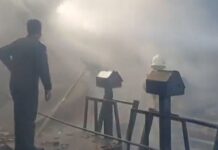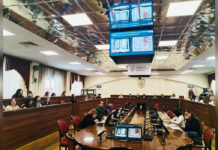X: @the_news_21
Tragedy struck Pakistan’s Balochistan province on Wednesday as two bomb explosions rocked election offices, casting a grim shadow over the eve of parliamentary elections.
The devastating blasts, targeting the election office of an independent candidate and the Jamiat Ulema Islam (JUI) party’s office, have claimed the lives of at least 22 individuals and left over two dozen others injured, as confirmed by provincial government officials.
Balochistan, known for its vast gas reserves and bordering Afghanistan and Iran, has long grappled with insurgency fueled by Baluch nationalists seeking greater autonomy. The conflict, which has persisted for over two decades, initially revolved around demands for equitable resource-sharing but later morphed into a broader struggle for independence. Compounding the unrest, various militant factions, including the Pakistani Taliban, have established a menacing presence in the region.
The absence of a claim of responsibility for the bombings has left authorities grappling with the task of ascertaining the perpetrators behind the heinous acts. The first explosion, which claimed 14 lives, struck the election office of an independent candidate in Pishin district, while the second blast, resulting in at least 10 fatalities, targeted a JUI office in Qilla Saifullah, situated near the Afghan border.
In response to the escalating violence, the Election Commission swiftly called for detailed reports from provincial officials and urged decisive action against those responsible for the attacks. With the parliamentary elections slated for Thursday, heightened security measures have been enacted, with over 500,000 security personnel deployed across the province. Against the backdrop of heightened tensions, electoral preparations are underway, with ballot papers being distributed to more than 90,000 polling stations.
As Balochistan grapples with the aftermath of these tragic incidents, the specter of violence looms large over the impending elections, underscoring the fragility of the region’s security landscape and the urgent need for concerted efforts to safeguard democratic processes and protect civilian lives.
Also Read: Indian Student Brutally Attacked in Chicago: Wife Seeks Help from Indian Government








where can i get cheap clomiphene without prescription where to get cheap clomid pill acquista clomiphene online buy cheap clomiphene clomid pills at dischem price can you get cheap clomid online buy cheap clomiphene tablets
Greetings! Extremely useful advice within this article! It’s the petty changes which wish turn the largest changes. Thanks a a quantity quest of sharing!
More posts like this would make the online elbow-room more useful.
zithromax brand – zithromax 500mg pills purchase metronidazole generic
buy rybelsus online – periactin order order cyproheptadine 4 mg online cheap
domperidone online order – order motilium 10mg generic flexeril for sale online
cheap amoxil for sale – buy diovan 80mg generic combivent 100mcg cost
amoxiclav online buy – https://atbioinfo.com/ acillin pills
purchase esomeprazole online cheap – https://anexamate.com/ order esomeprazole 40mg capsules
buy cheap coumadin – coumamide buy losartan 25mg pills
order meloxicam 15mg sale – mobo sin meloxicam 15mg cheap
prednisone us – https://apreplson.com/ prednisone online
best ed pill for diabetics – fastedtotake erectile dysfunction medicines
purchase amoxil pill – https://combamoxi.com/ amoxil oral
buy fluconazole 100mg online – https://gpdifluca.com/# fluconazole drug
order cenforce 50mg online cheap – on this site cenforce 100mg cost
what is cialis taken for – https://ciltadgn.com/# cialis 100mg from china
buy ranitidine medication – click zantac 300mg brand
cialis online no prescription australia – strong tadafl order cialis online cheap generic
The vividness in this ruined is exceptional. order nolvadex online
buy in real viagra – https://strongvpls.com/ buy viagra uk boots
Greetings! Extremely productive suggestion within this article! It’s the petty changes which liking make the largest changes. Thanks a quantity quest of sharing! https://buyfastonl.com/
Thanks for putting this up. It’s well done. https://ursxdol.com/azithromycin-pill-online/
The reconditeness in this ruined is exceptional. https://prohnrg.com/
This website really has all of the tidings and facts I needed there this case and didn’t know who to ask. https://aranitidine.com/fr/acheter-fildena/
More posts like this would make the online space more useful. https://ondactone.com/simvastatin/
Thanks recompense sharing. It’s first quality.
https://doxycyclinege.com/pro/topiramate/
Thanks for putting this up. It’s well done. http://zqykj.cn/bbs/home.php?mod=space&uid=302440
order forxiga 10 mg online cheap – on this site buy forxiga sale
buy xenical online cheap – https://asacostat.com/ orlistat order
We stumbled over here different web address and thought I might check things out.
I like what I see so i am ust following you.
Look forward to looking at your web page for a second time. https://Glassi-India.Mystrikingly.com/
This is the type of advise I recoup helpful. http://www.01.com.hk/member.php?Action=viewprofile&username=Ngseen
You can conserve yourself and your ancestors by being wary when buying panacea online. Some pharmacy websites operate legally and put forward convenience, secretiveness, cost savings and safeguards to purchasing medicines. buy in TerbinaPharmacy https://terbinafines.com/product/doxycycline.html doxycycline
I am in point of fact happy to glance at this blog posts which consists of tons of worthwhile facts, thanks representing providing such data. dominique levitre
This is a theme which is in to my callousness… Numberless thanks! Unerringly where can I notice the phone details an eye to questions?
采用高效谷歌外推策略,快速提升网站在搜索引擎中的可见性与权重。谷歌外推
Tham gia cộng đồng game thủ tại Go88 để trải nghiệm các trò chơi bài, poker phổ biến nhất hiện nay.
casino table toppers spa
usa online casino real money
online casino tournaments
Synchronize your plays with rhythmic slots and rhythmic wins. crown coin casino official site provides demo modes for practice. Hone your skills and go for gold!
Nothing beats the thrill of Sweet Bonanza — tumbling wins and bomb multipliers galore! Trigger sweet bonanza real money the bonus round and multiply your fortune. Play today!